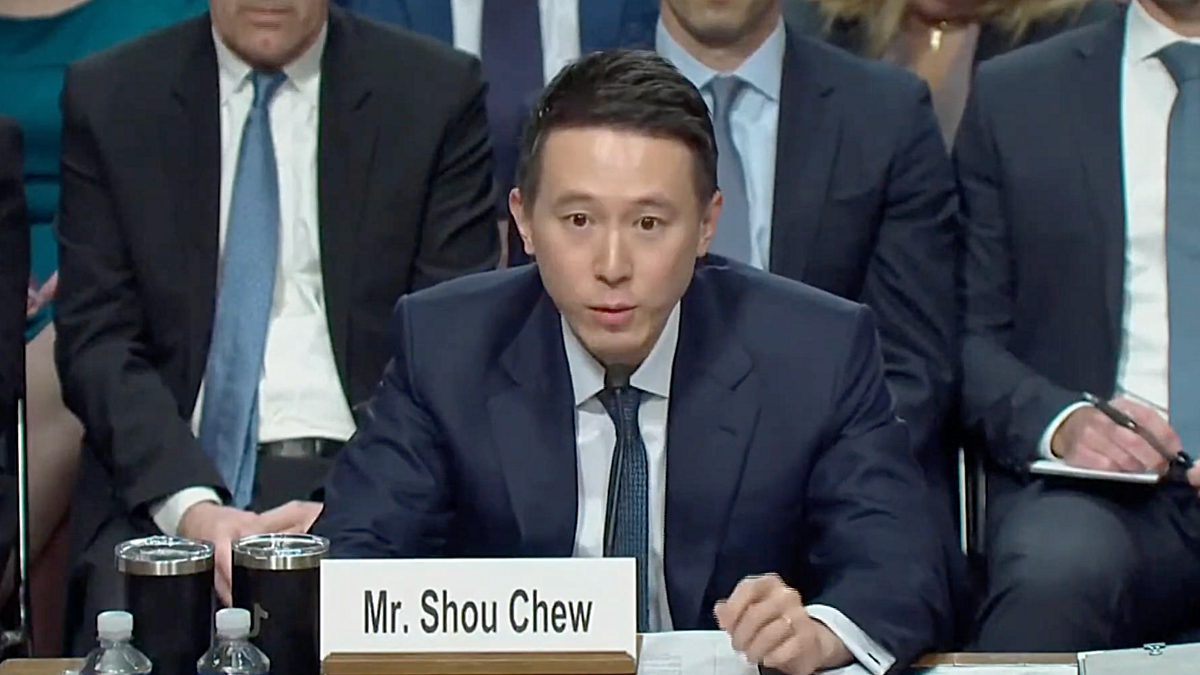Senators Engage in Bigotry, Advance Conspiracy Theories While Questioning TikTok CEO Shou Chew
Shubhi Mathur / Feb 2, 2024
TikTok CEO Shou Chew testifies to the US Senate Judiciary Committee at the Capitol in Washington DC, January 31, 2024.
On January 31, the Senate Judiciary Committee hearing on "Big Tech and the Online Child Sexual Exploitation Crisis" started off with the good intention of bringing to light the harrowing stories of victims of online abuse and interrogating the associated actions of platforms. The CEOs of Meta, Snap, Discord, X, and TikTok were assembled to answer urgent questions about child online safety. But the proceedings took an unfortunate turn when TikTok CEO Shou Chew became the subject of what The New Republic referred to as “a series of increasingly racist questions” about his citizenship, loyalties, and personal politics.
Some questions related to TikTok and its relationship with its Chinese parent company, were, of course, legitimate. Senators repeatedly circled around questions about TikTok’s connections to ByteDance, expressing concern about its data localization policies, and potential sharing of data with the Chinese government. This scrutiny was driven by apprehensions arising from a law mandating Chinese companies to provide data access to intelligence services. Most of these questions were rehashed from Chew’s appearance before the House Energy and Commerce Committee almost a year ago. While it is to be expected that security concerns about China and the strategic challenge it poses to US interests might prompt sharp questions for the only CEO at the hearing who was not based in the US, Senators went beyond such concerns, targeting Chew personally and devolving into outright bigotry.
Senator Tom Cotton (R-AR) took the lead with a barrage of racially-tinged questions, repeatedly probing Chew on matters well beyond the purview of the hearing. Digging deep into Chew’s past experience of working with Xiaomi, he posed questions like, “Where did you live when you worked at Xiaomi? and “Isn't it the case that Xiaomi was sanctioned by the United States government in 2021 for being a communist Chinese military company?”. He further took a political swing at the reversal of sanctions on Xiaomi and drew a strange parallel with the Biden administration’s reversal of the terrorist designation of the Houthis in Yemen.
Despite Chew's repeated clarification of his Singaporean nationality and his service in Singapore’s military, Sen. Cotton persisted with questions like, "What nationality’s passport do you hold?", “Have you ever applied for Chinese citizenship?” and "Have you ever been a member of the Chinese Communist Party?" The line of inquiry took a particularly insulting turn when Sen. Cotton questioned the citizenship of Chew’s family (they are Americans) and whether he had ever applied for American citizenship.
Not satisfied that Chew refused to concede taking orders from the Chinese Communist Party, Sen. Cotton further intensified his line of questioning, pressing Chew on his views regarding the Tiananmen Square massacre and Chinese President Xi Jinping. He then sketched the outlines of a conspiracy theory connecting Cristina Caffara, a consultant who has advised both ByteDance and the Federal Trade Commission, with some purported effort by the Biden administration to manipulate TikTok towards its political interests.
This relentless grilling seemed to reflect a bias among some senators against foreign CEOs and non-US headquartered companies, raising concerns about the future treatment of foreign business leaders in the US, particularly those of Asian ethnicity. Senator Josh Hawley (R-MO), directly remarked, “Why should your platform not be banned in the United States of America? You are owned by a Chinese communist company or a company based in China.” He concluded his time by stating, “Your app ought to be banned in the United States of America for the security of this country.”
Sen. Ted Cruz (R-TX) joined his Republican colleagues in asking questions about TikTok’s relationship to China. He accused TikTok of disseminating content tailored to benefit children on the Chinese version of TikTok while allegedly promoting harmful content on the version of the app that is available in the United States. Chew pushed back, but was dismissed. Sen. Cruz never explained how such a scheme would work or what evidence he has for it, but he did manage to get his soundbite.
This Senate Judiciary Committee hearing was disheartening, not only due to the lack of significant action items beyond political posturing but also because elected officials publicly engaged in a troubling pattern of prejudice, insulting a business leader and insinuating he is a national security threat just because of his ethnicity, all on live TV. There are legitimate national security issues that should be asked about TikTok and its operations. Unfortunately, the Senate Judiciary Committee spent more time drawing a caricature than trying to get an accurate picture of the facts.
Authors
